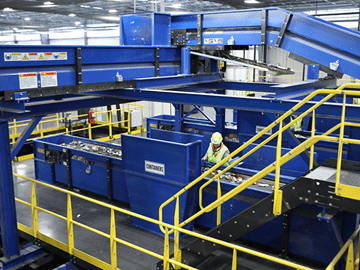
Top Recycling Technologies Supporting the Manufacturing Industry
When businesses that involve manufacturing make recycling a priority, it can be more sustainable for the environment and have a positive impact on the bottom line.Byline: BTB Editor
July 10, 2024 / Time to read: 5 minutesA
One way businesses can improve their sustainability quotient is by diverting more materials away from landfills and toward recycling operations. Another way is to use recycled materials in the manufacturing process.
There are constantly evolving demands for various materials your plant could be recycling.
For example,
But recycling isn’t always an obvious or viable choice for manufacturing plants. Like we outlined in our article on recycling barriers faced in construction and demolition industries, some challenges manufacturing plants might face regarding recycling include:
- Lack of recycling options nearby
- Lack of resources to manage recycling collection and processes
- Higher expenses to separate and recycle materials
- Lack of space for recycling collection
While there are some challenges, recycling in manufacturing continues to evolve and has come a long way in recent years. New technologies provide companies with more ways to recycle.
Since consumers are increasingly ecologically minded, companies that embrace sustainability and improve their recycling efforts could offset recycling costs by improving customer sentiment and, thus, sales.
There are also potential immediate financial benefits to recycling, such as rebates for various materials. If you’re considering improving your recycling efforts in manufacturing or want to create a recycling program from scratch, consider these recycling technologies and partners that can help.
TerraCycle
- Positive Economic Waste Streams: TerraCycle will purchase these, and you avoid sending them to a landfill.
- Natural Economics: These waste streams have comparable recycling/disposal costs. By recycling them, you could improve sustainability.
- Negative Economics: These waste streams may be more costly to recycle than to dispose of, but the environmental benefits may be significant, which could improve your business sustainability efforts.
TerraCycle offers several loading methods for materials, including live loading at a plant and having TerraCycle pick up the material; a drop trailer delivered by TerraCycle that you’d load materials into; or delivery of materials from a plant to TerraCycle.
The first step to work with TerraCycle is to
Closed-Loop Manufacturing
You may be familiar with closed-loop manufacturing if you’ve heard the term “up-cycling.” Closed-loop manufacturing is using material waste and recycled products to create new materials, which may then possibly be recycled again and again. Instead of sending waste to a landfill, closed-loop manufacturing processes give that waste a valuable purpose.
Companies from
When companies use material waste and recycled materials to create new products, they can share those efforts with consumers and boost their sustainability profile.
Ultimately, reusing materials also cuts down on manufacturing costs, including have to source or create virgin materials for products.
Advanced Recycling / Mixed Plastics Recycling
Advanced recycling, also called chemical recycling, is a process of changing the chemical structure of plastic waste like composite and laminated plastics and plastic films. Through this process, the plastics can be used for new purposes.
For example, by converting plastic properties into shorter molecules, the plastic waste can be used to produce:
- Virgin plastics
- Synthesis gas
- Liquid and semi-liquid products
- Petrochemicals and fuels
- Industrial waxes
When they’re not recycled, “hard to recycle” plastics may be exported, buried or incinerated. To avoid this, manufacturers may adopt advanced recycling methods for their plastic waste.
One England-based company called
Today, Tesco has soft plastic collection points throughout its chain of stores; soft plastic isn’t eligible for home recycling. The plastic will be recycled into new packaging.
Here in the U.S., Hefty launched its
Manufacturing plants that produce hard-to-recycle plastic waste can look into advanced, or chemical recycling options. One company to watch is
The PureCycle Technologies process separates contaminants, color and odor from plastic waste feedstock so it can be transformed into recycled polypropylene (PP). This polymer plastic can be used to create products like packaging, reusable containers, automotive components and laboratory equipment.
Republic Services
Republic Services is also working on innovating recycling technology for businesses that use manufacturing plants to produce products. For example, our
- Optical sorters
- Next-generation anti-wrap fiber screens
- Automated, touch screen control systems
- Tablet-based capabilities for real-time systems management, remote access and data acquisition
Republic Services recycling plants are available throughout the country to help manufacturing facilities divert more waste into recycling and earn potential rebates that can provide financial savings. We also partner with recycling plants across the country to make recycling available to more manufacturers.
If your manufacturing plant is interested in creating or improving a recycling strategy,
- Identify potential recycling materials that are being mixed in with waste streams, which could help your business be more sustainable and possibly save with rebates when you recycle them instead
- Learn how to avoid cross-contamination in manufacturing recycling
- Discover what types of recycling markets are available for your plant
- Find recycling solutions that help you achieve your sustainability goals
Republic Services partners receive a dedicated account executive to help optimize recycling and waste management, save money, avoid downtime and help keep employees safe through robust waste compliance standards. Learn about
